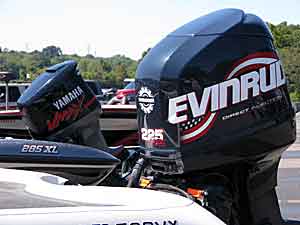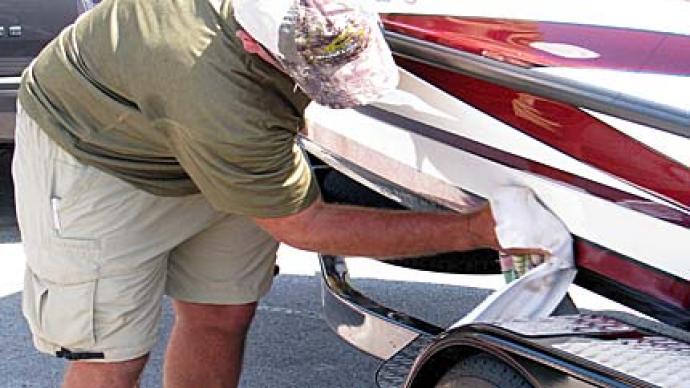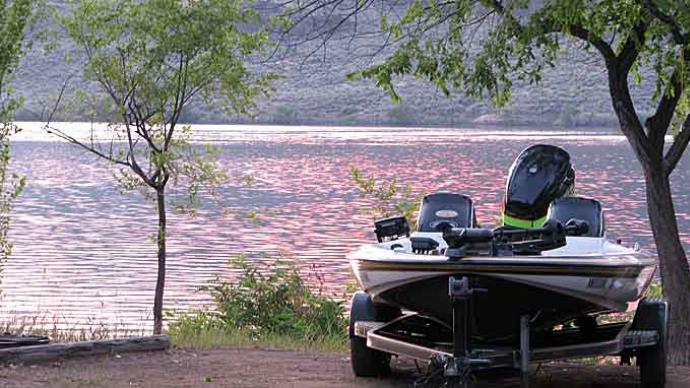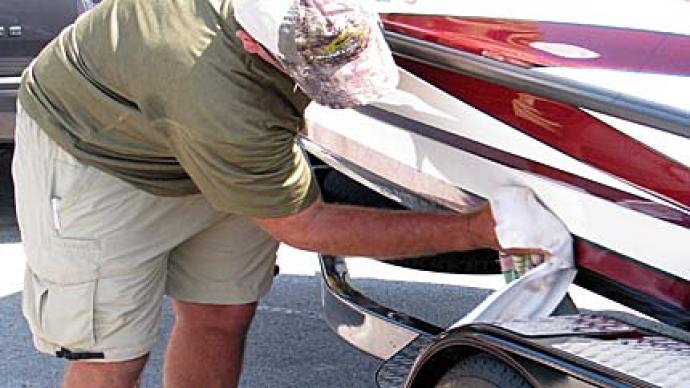
We went to one of the best in the business for your most significant fishing investment in the sport - your boat and motor. James Wilkins, owner of Bowie Marine in Decatur (Texas), sells and services bass boats and Mercury and Evinrude motors and has many years of experience with every make and model of bass rig. Here are his suggestions.
On your first fishing trip to the lake following winter storage, or even after a relatively short time of not using your boat, a few things should be checked to ensure you have a good trip.
Says Wilkins, "Having spent over 20 years in the marine business, both in boat sales and service, I've learned that prevention of problems begins with some straightforward maintenance."
According to his "checklist," your batteries are essential to check before leaving the house. All batteries should be fully charged and full of acid. Most battery problems occur because batteries are overcharged. This boils the acid out and dramatically reduces the life of the battery.
Another of the most overlooked things in boat maintenance is the kill switch lanyard. "Many times a customer has come to me," says Wilkins, "and said his engine wouldn't start. I often find that the lanyard cap has deteriorated, and the button on the MI switch is in stop mode. "Before you panic, pull the lanyard off, and depress the button by hand. If the engine starts, replace the lanyard."
According to Wilkins, other problems can also occur frequently at the first of the year. Over time, bad fuel and oil hoses can cause leaks and allow air into the system. The easiest way to care for these problems is to visually inspect all hoses and connections. If any appear stiff or loose at the connection, replace the hose and clamp. Once all hoses and connections are tight, pump the fuel and oil bulb up and look for leaks. All fuel and oil lines must be tight.
Always check the engine mounting bolts before your first trip to the lake. It's essential to ensure they haven't backed off during the last season.
Steering cables should also be checked. They should work easily in both directions. If it's hard to steer in either direction, grease the cables. If the cables are greased and still hard to turn, change them. They might only make part of the season anyway.
Lower unit inspection is also essential. Check for any signs of water in the oil and make sure the oil level is full. Pull the propeller and check for any fishing line wrapped around the shaft. This can cut the shaft seal and let in water or oil out. Be sure to grease the prop shaft splines before replacing the propeller, and always torque the prop nut to specs.
Power trim and tilt will need to be checked. To do this, always tilt the engine to the up position and pull the plug out. The reservoir oil level should be level with the threads.
Wiring is one of the most important things to check on the boat. If it had been in a garage, our four-legged friends might have eaten some of the insulation off the wiring, even if the boat was covered. If the wiring needs replacing and the job is not done, you can expect electrical failure. Even worse, your boat could catch on fire.
Thru-hull fittings and hoses can be a problem as well, he says. "This is just like the fuel system on the engine fittings and hoses must be airtight. It's not much fun to be fishing and look down only to see water filling the boat floor."
And for all you "pros" out there, don't forget to put in the drain plug. But I'm sure none of you ever forgot that. Yes, most boat owners have done it at least once.
Also, says Wilkins, be sure to check your aerator and bilge pump for cracks in the housings due to freezing. This can be another source of getting a boat full of water.
"Your trailer will need a little looking over, too. The most overlooked item on this piece is likely the easiest to maintain. Being broken down on the side of the road with a wheel bearing burned out has to be one of the worst things to happen to you. The hub and spindle get ruined, and there won't be a town for 50 miles."
We've all been there before. The easiest way to prevent breakdowns, such as burned-out wheel bearings, and all the other things mentioned here, is to do preventative maintenance and not allow them in the first place.
"Older trailers have Bearing Buddies or something similar," says Wilkins. "This will help, but it is by no means a complete fix. It's a good idea to pack the wheel bearings and replace the seals at least once a year. And don't forget to check for any signs of water or rough spots on bearings or races."
When packing the bearings, remember to use waterproof grease. Also, remember to grease or oil your trailer jack; it also has gears. "All trailer wiring and lights should be checked regularly for signs of wear. Light bulbs, especially those that are uncovered, should be removed and a light coating of grease or oil applied to the end of the bulb so that rust or corrosion will be kept at a minimum."
Remember, the more you do to maintain your rig, the longer it will last and the more pleasure it will give you when you use it.




